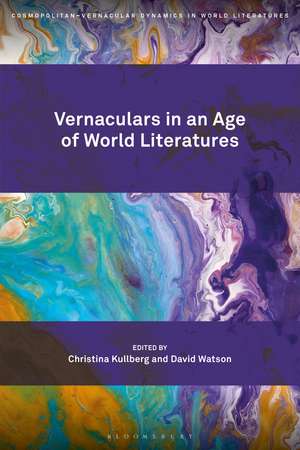Vernaculars in an Age of World Literatures: Cosmopolitan-Vernacular Dynamics in World Literatures
Editat de Professor or Dr. Christina Kullberg, David Watsonen Limba Engleză Paperback – 20 sep 2023
| Toate formatele și edițiile | Preț | Express |
|---|---|---|
| Paperback (1) | 192.82 lei 43-57 zile | |
| Bloomsbury Publishing – 20 sep 2023 | 192.82 lei 43-57 zile | |
| Hardback (1) | 570.28 lei 43-57 zile | +122.12 lei 5-11 zile |
| Bloomsbury Publishing – 23 feb 2022 | 570.28 lei 43-57 zile | +122.12 lei 5-11 zile |
Preț: 192.82 lei
Preț vechi: 250.15 lei
-23% Nou
Puncte Express: 289
Preț estimativ în valută:
36.90€ • 38.62$ • 30.71£
36.90€ • 38.62$ • 30.71£
Carte tipărită la comandă
Livrare economică 31 martie-14 aprilie
Preluare comenzi: 021 569.72.76
Specificații
ISBN-13: 9781501374098
ISBN-10: 1501374095
Pagini: 304
Dimensiuni: 152 x 229 x 25 mm
Greutate: 0.41 kg
Editura: Bloomsbury Publishing
Colecția Bloomsbury Academic
Seria Cosmopolitan-Vernacular Dynamics in World Literatures
Locul publicării:New York, United States
ISBN-10: 1501374095
Pagini: 304
Dimensiuni: 152 x 229 x 25 mm
Greutate: 0.41 kg
Editura: Bloomsbury Publishing
Colecția Bloomsbury Academic
Seria Cosmopolitan-Vernacular Dynamics in World Literatures
Locul publicării:New York, United States
Caracteristici
Covers a wide range of literatures, ranging from India, China, Spain, France, the Baltic region, and the larger Creole culturescape of the Caribbean (Surinam, the Antilles, Jamaica, and the American South)
Notă biografică
Christina Kullberg is Professor of French literature at Uppsala University, Sweden, and author of The Poetics of Ethnography in Martinican Narratives: Exploring the Self and the Environment (2013). She is on the steering committee of the research program Cosmopolitan and Vernacular Dynamics in World Literature.David Watson is Associate Professor in the Department of English at Uppsala University, Sweden.
Cuprins
Notes on ContributorsAcknowledgementsSeries Introduction - The Cosmopolitan-Vernacular Dynamic: Conjunctions of World LiteratureHelena Bodin (Stockholm University, Sweden), Stefan Helgesson (Stockholm University, Sweden), Christina Kulberg (Uppsala University, Sweden), Paul Tenngart (Lund University, Sweden), and Helena Wulff (Stockholm University, Sweden)Introduction: Theorizing the VernacularChristina Kullberg and David Watson (Uppsala University, Sweden) 1. Contextualizing the Vernacular: Signposts from African Language, Writing, and LiteratureMoradewun Adejunmobi (University of California Davis, USA)2. Vernacular Resistance: Catalan, Basque, and Galician Opposition to Francoist MonolingualismChristian Claesson (Lund University, Sweden)3. The Modern Adventures of Kanian Poongundranar, Classical Tamil Poet: Reflections on Literatures of the World, Vernacularly SpeakingS. Shankar (University of Hawai'i, USA)4. Vernacular Soundings: Poetry from the Lesser Antilles in the Aftermaths of Hurricanes Irma and MariaChristina Kullberg (Uppsala University, Sweden)5. From Fesiten to Fesibuku: Shifting Priorities in the Saamaka VernacularRichard Price and Sally Price (College of William and Mary, USA)6. Cosmopolitan and Vernacular Dynamics in Modern Chinese Fiction and Lao She's Satirical Novel Cat CountryLena Rydholm (Uppsala University, Sweden)7. Worldly Themes and Vernacular Literature: Aino Kallas on Gender, Ethnicity, and ClassKatarina Leppänen (Gothenburg University, Sweden)8. Specters of the Vernacular: Neoliberalism, World Literature, and Marlon James' A Brief History of Seven KillingsDavid Watson (Uppsala University, Sweden)9. Vernacular Imagination and Exophone Reconfiguration in Francophone Chinese Diasporic LiteratureShuangyi Li (Lund University, Sweden)Vernacular Lessons: Dante, Cavafy, Gombrowicz (Instead of an Afterword)Galin Tihanov (Queen Mary University, UK) Index
Recenzii
An important intervention in the current debate on world literature. This engaging volume, starting from the premise that the cosmopolitan and the vernacular are complementary rather than opposed to one another, studies how the often tangled relationship region/nation/world plays out in a number of literatures around the world.
The interaction of languages that travel and those that stay home, and the cultural choices that follow, have profoundly influenced literatures, from epics to novels; politics, from empires to nations; and much else. This rich collection of essays is the first to address these problems for global modernity. It deserves to be warmly welcomed and widely studied.
The interaction of languages that travel and those that stay home, and the cultural choices that follow, have profoundly influenced literatures, from epics to novels; politics, from empires to nations; and much else. This rich collection of essays is the first to address these problems for global modernity. It deserves to be warmly welcomed and widely studied.



